Fleurs du Mal Magazine


Or see the index

Karazah To Karl
Come back to me! my life is young,
My soul is scarcely on her way,
And all the starry songs she’s sung,
Are prelude to a grander lay.
Come back to me!
Let this song-born soul receive thee,
Glowing its fondest truth to prove;
Why so early did’st thou leave me,
Are our heaven-grand life of love?
Come back to me!
My burning lips shall set their seal
On our betrothal bond to-night,
While whispering murmurs will reveal
How souls can love in God’s own light.
Come back to me!
Come back to me! The stars will be
Silent witnesses of our bliss,
And all the past shall seem to thee
But a sweet dream to herald this!
Come back to me!
Adah Isaacs Menken
(1835 – 1868)
Karazah To Karl
•fleursdumal.nl magazine
More in: - Archive Tombeau de la jeunesse, Archive M-N, Archive M-N, Menken, Adah, THEATRE
Ocean Vuong returns with a bighearted novel about chosen family, unexpected friendship, and the stories we tell ourselves in order to survive
 One late summer evening in the post-industrial town of East Gladness, Connecticut, nineteen-year-old Hai stands on the edge of a bridge in pelting rain, ready to jump, when he hears someone shout across the river.
One late summer evening in the post-industrial town of East Gladness, Connecticut, nineteen-year-old Hai stands on the edge of a bridge in pelting rain, ready to jump, when he hears someone shout across the river.
The voice belongs to Grazina, an elderly widow succumbing to dementia, who convinces him to take another path. Bereft and out of options, he quickly becomes her caretaker.
Over the course of the year, the unlikely pair develops a life-altering bond, one built on empathy, spiritual reckoning, and heartbreak, with the power to transform Hai’s relationship to himself, his family, and a community on the brink.
Following the cycles of history, memory, and time, The Emperor of Gladness shows the profound ways in which love, labor, and loneliness form the bedrock of American life. At its heart is a brave epic about what it means to exist on the fringes of society and to reckon with the wounds that haunt our collective soul.
Hallmarks of Ocean Vuong’s writing—formal innovation, syntactic dexterity, and the ability to twin grit with grace through tenderness—are on full display in this story of loss, hope, and how far we would go to possess one of life’s most fleeting mercies: a second chance.
Ocean Vuong is the author of the critically acclaimed poetry collections Night Sky with Exit Wounds and Time Is a Mother, as well as the novels On Earth We’re Briefly Gorgeous and The Emperor of Gladness. A recipient of the MacArthur Fellowship and the American Book Award, he used to work as a fast-food server, which inspired The Emperor of Gladness. Born in Saigon, Vietnam, he currently splits his time between Northampton, Massachusetts, and New York City.
The Emperor of Gladness
A Novel
By Ocean Vuong
Category: Literary Fiction
Publisher: Penguin Press
May 13, 2025
Language: English
416 pages
ISBN-10:059383187X
ISBN-13:978-0593831878
Hardcover
$30.00
• fleursdumal.nl magazine
More in: #Editors Choice Archiv, - Book News, - Bookstores, Archive U-V, Archive U-V, Ocean Vuong
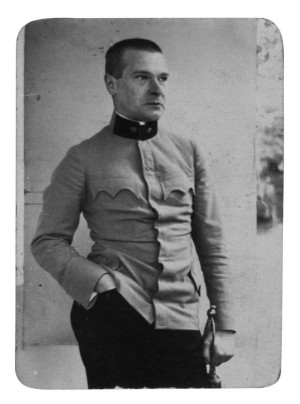
Sonja
Abend kehrt in alten Garten;
Sonjas Leben, blaue Stille.
Wilder Vögel Wanderfahrten;
Kahler Baum in Herbst und Stille.
Sonnenblume, sanftgeneigte
Über Sonjas weißes Leben.
Wunde, rote, niegezeigte
Läßt in dunklen Zimmern leben,
Wo die blauen Glocken läuten;
Sonjas Schritt und sanfte Stille.
Sterbend Tier grüßt im Entgleiten,
Kahler Baum in Herbst und Stille.
Sonne alter Tage leuchtet
Über Sonjas weiße Brauen,
Schnee, der ihre Wangen feuchtet,
Und die Wildnis ihrer Brauen.
Georg Trakl
(1887 – 1914)
Sonja
• fleursdumal.nl magazine
More in: #Experimental Poetry Archive, - Archive Tombeau de la jeunesse, Archive S-T, Archive S-T, Expressionism, Trakl, Georg, Trakl, Georg

Achtergrondgeluk
Hij kan zich niet herinneren wanneer precies hij
voor het eerst hoorde dat je ook iets anders kon
geloven. Ongeveer toen die weder te keren
weemoed in in generfd leder gebonden albums
werd geplakt. Iemand vertelde hem toentertijd,
lang geleden, ook dat hij niet bang mocht zijn.
Bert Bevers
Achtergrondgeluk
Ongepubliceerd
•fleursdumal.nl magazine
More in: Archive A-B, Archive A-B, Bevers, Bert
Fierce, frank, witty poetry about cancer diagnosis, treatment, remission, and end-of-life
Written in the last three years of her life, Andrea Werblin Reid‘s To See Yourself As You Vanish is a collection of unsparingly brave and insightful poems about her experience with ovarian cancer. Frank, fierce, and witty, her work does not hide behind cliches, platitudes, or tropes, but addresses the hopes, frustrations, fears, and longings that would be easy to leave unspoken.
 She offers friendship and understanding to those who share her experiences and powerful insights for caregivers and those who work in oncology, hospice, research, and psychology. Of these poems, Reid herself said: “I have struggled with the implications of war metaphors and the perspectives they perpetuate since receiving my own cancer diagnosis.
She offers friendship and understanding to those who share her experiences and powerful insights for caregivers and those who work in oncology, hospice, research, and psychology. Of these poems, Reid herself said: “I have struggled with the implications of war metaphors and the perspectives they perpetuate since receiving my own cancer diagnosis.
People living with cancer and other chronic illnesses are not taking up arms, they are living as long and as humanely as possible: not to win or lose, simply to live.” The scenes in these poems are rich and spare, magical and sane, awful and special: “one bird comes to the end of his branch looking like a clever moustache. /one bird comes to the end of his song like an ordinary bird.”
ANDREA WERBLIN REID (1965–2022) is the author of Lullaby for One Fist (Wesleyan, 2001) and Sunday with the Sound Turned Off (Lost Horse, 2014). Her poem “Language is the Virus” was named a finalist for the prestigious Perkoff Prize from the Missouri Review and her work has been published in the LA Review of Books, Virginia Quarterly Review, Massachusetts Review, Brooklyn Rail, Pank, Smartish Pace, and more.
THE COLOR OF WAITING
is hypnotic pink, under whose spell
you’ve been living for years
like a small fossilized creature.
or magenta, a bruise
that evolves,
(. . .)
then sharp as the serrated smiles
doctors have been honing for years.
waiting masquerades as the inflatable idea
of hope, waterproofed for safety, maybe,
devoid of vision, punctured that easily
To See Yourself as You Vanish
poetry by
Andrea Werblin Reid
Series: Wesleyan Poetry Series
Sales Date: 09-09-2025 !
88 Pages
Hardcover
ISBN 9780819502070
$26.95
• fleursdumal.nl magazine
More in: #Editors Choice Archiv, (Terminal) diseases, - Book News, - Bookstores, Archive Q-R, Archive Q-R
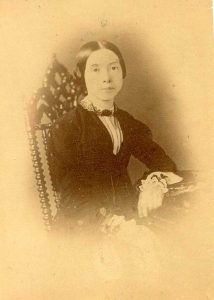
I’m Nobody!
Who are you?
I’m Nobody! Who are you?
Are you – Nobody – too?
Then there’s a pair of us!
Dont tell! they’d banish us – you know!
How dreary – to be – Somebody!
How public – like a Frog –
To tell your name – the livelong June –
To an admiring Bog!
Emily Dickinson
(1830—1886)
I’m Nobody! Who are you?
• fleursdumal.nl magazine
More in: Archive C-D, Archive C-D, Dickinson, Emily

Der Brief
Ein Fetzen Weh, vom Wind daher gefegt,
Das war er nun.
Ich hab’ ihn still ins heil’ge Buch gelegt,
Zu ruhn – zu ruhn—–
Und die vergilbten Blätter schlössen ihn
So linde ein,
Wie Totenhülle, weißer denn Jasmin,
Der braune Schrein.
So fern der Unrast, die da draußen tost,
Hat er geruht.
Und war der Klage voll und gab mir Trost
Er war so gut—–
Gertrud Kolmar
(1894 – 1943)
Der Brief
•fleursdumal.nl magazine
More in: *War Poetry Archive, Archive K-L, Archive K-L, Kolmar, Gertrud

De tuin is groener nog dan het woord
De tuin is groener nog dan het woord
vermoeden doet. Er in schommelt
een klein meisje zich naar de hemel,
ongehinderd door toevallige goden.
Morgen zal zij parmantig ter communie
gaan met om de schouder wit een tasje
vol onschuld, van oma gekregen.
Haar ogen zijn nog zonder hinderlagen.
Nog koestert zij de wortels om haar voeten,
laat zij zich door alle sprookjes tergen.
De grote vlucht is nog veraf.
Bert Bevers
De tuin is groener nog dan het woord
Verschenen in Preludium, jaargang 5, nummer 4,
Breda, maart 1989
Bert Bevers is dichter en schrijver
Hij woont en werkt in Antwerpen (Be)
•fleursdumal.nl magazine
More in: Archive A-B, Archive A-B, Bevers, Bert
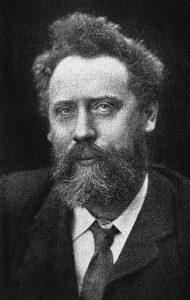
I Am The Reaper
I am the Reaper.
All things with heedful hook
Silent I gather.
Pale roses touched with the spring,
Tall corn in summer,
Fruits rich with autumn,
and frail winter blossoms—
Reaping, still reaping—
All things with heedful hook
Timely I gather.
I am the Sower.
All the unbodied life
Runs through my seed-sheet.
Atom with atom wed,
Each quickening the other,
Fall through my hands,
ever changing, still changeless.
Ceaselessly sowing,
Life, incorruptible life,
Flows from my seed-sheet.
Maker and breaker,
I am the ebb and the flood,
Here and Hereafter,
Sped through the tangle and coil
Of infinite nature,
Viewless and soundless
I fashion all being.
Taker and giver,
I am the womb and the grave,
The Now and the Ever
William Ernest Henley
(1849—1903)
I Am The Reaper
• fleursdumal.nl magazine
More in: Archive G-H, Archive G-H, Henley, William Ernest
 One woman, the performance of a lifetime. Or two.
One woman, the performance of a lifetime. Or two.
An exhilarating, destabilizing Möbius strip of a novel that asks whether we ever really know the people we love.
Two people meet for lunch in a Manhattan restaurant.
She’s an accomplished actress in rehearsals for an upcoming premiere.
He’s attractive, troubling, young—young enough to be her son.
Who is he to her, and who is she to him?
In this compulsively readable, brilliantly constructed novel, two competing narratives unspool, rewriting our understanding of the roles we play every day – partner, parent, creator, muse – and the truths every performance masks, especially from those who think they know us most intimately.
Taut and hypnotic, Audition is Katie Kitamura at her virtuosic best.
Katie Kitamura is the author of four previous novels, most recently A Separation and Intimacies, which was longlisted for the National Book Award and the PEN/Faulkner Award and was a finalist for a Joyce Carol Oates Prize. She is a recipient of the Rome Prize in Literature, a Lannan fellowship, and many other honors, and her work has been translated into twenty-one languages. She teaches in the creative writing program at New York University.
Audition: A Novel
by Katie Kitamura (Author)
Language: English
Paperback
April 8, 2025
Publisher: Riverhead Books
EAN: 9798217045839
21,95 euro
• fleursdumal.nl magazine
More in: - Book Lovers, - Book News, - Bookstores, Archive K-L, Archive K-L
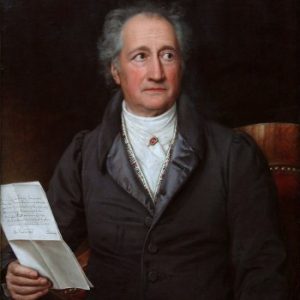
Eins und Alles
Im Grenzenlosen sich zu finden,
Wird gern der Einzelne verschwinden,
Da löst sich aller Überdruß;
Statt heißem Wünschen, wildem Wollen,
Statt läst’gem Fordern, strengem Sollen
Sich aufzugeben ist Genuß.
Weltseele, komm’ uns zu durchdringen!
Dann mit dem Weltgeist selbst zu ringen
Wird unsrer Kräfte Hochberuf.
Teilnehmend führen gute Geister,
Gelinde leitend, höchste Meister,
Zu dem, der alles schafft und schuf.
Und umzuschaffen das Geschaffne,
Damit sich’s nicht zum Starren waffne,
Wirkt ewiges lebend’ges Tun.
Und was nicht war, nun will es werden
Zu reinen Sonnen, farbigen Erden,
In keinem Falle darf es ruhn.
Es soll sich regen, schaffend handeln,
Erst sich gestalten, dann verwandeln;
Nur scheinbar steht’s Momente still.
Das Ewige regt sich fort in allen:
Denn alles muß in Nichts zerfallen,
Wenn es im Sein beharren will.
Johann Wolfgang von Goethe
(1749-1832)
Eins und Alles
•fleursdumal.nl magazine
More in: Archive G-H, Archive G-H, Goethe, Johann Wolfgang von, J.W. von Goethe
The daring and deeply sexy poems in Lonely Women Make Good Lovers are bold with the embodied, earthy, and startlingly sensual.
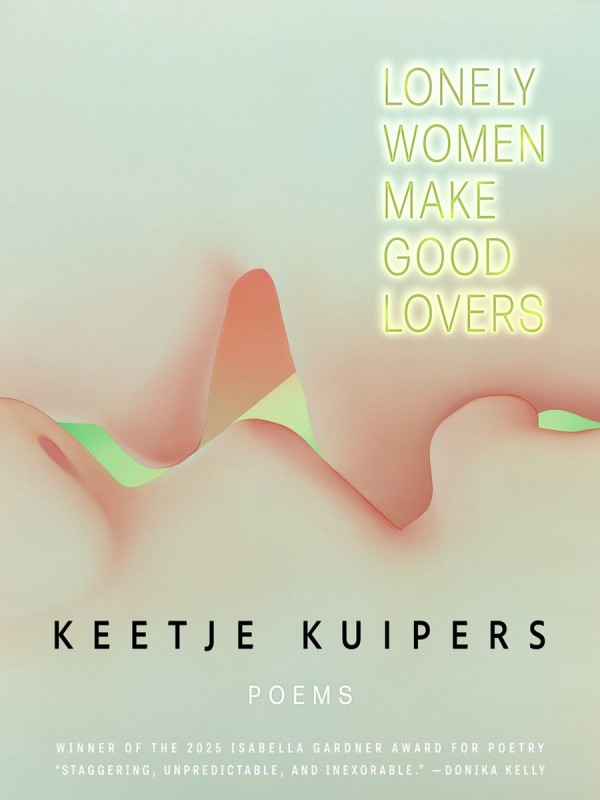
These unforgettable love poems—queer, complicated, and almost always compromised—engage a poetics of humility, leaning into the painful tendernesses of unbridgeable distance. As Kuipers writes, love is a question “defined not by what we / cannot know of the world but what we cannot know of ourselves.” These poems write into that intricate webbing between us, holding space for an “I” that is permeable, that can be touched and changed by those we make our lives with.
In this book, astonishingly intimate poems of marriage collide with the fetishization of freedom and the terror of desire. At times valiant and at others self-excoriating, they are flush with the hard-won knowledge of the difficulties and joys of living in relation.
Keetje Kuipers’ newest collection of poetry, Lonely Women Make Good Lovers, was the recipient of the Isabella Gardner Award. Her poetry and prose have appeared in The New York Times Magazine, The American Poetry Review, and POETRY, and have been honored by publication in The Pushcart Prize and Best American Poetry anthologies. She has been a Stegner Fellow, Bread Loaf Fellow, and the Margery Davis Boyden Wilderness Writing Resident. Kuipers lives with her wife and children in Montana, where she is editor of Poetry Northwest.
Lonely Women Make Good Lovers
Poems
By Keetje Kuipers
Publisher: BOA Editions Ltd.
April 8, 2025
Language: English
Paperback : 96 pages
ISBN-10: 1960145452
ISBN-13: 978-1960145451
Regular price €17,95
• fleursdumal.nl magazine
More in: #Editors Choice Archiv, - Book Lovers, - Book News, - Bookstores, Archive K-L, Archive K-L, Kuipers, Keetje
Thank you for reading Fleurs du Mal - magazine for art & literature